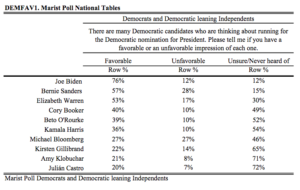How much of the vicious, fact-free attacks on the Covington kids were just baseline floating animus against Christians and Trump supporters on the part of the media, and how much are battlespace preparation over a possible nomination of Amy Coney Barrett to replace Ruth Bader Ginsberg?
The northeastern part of Columbus, Ohio used to be an unpretentious, unremarkable part of America. You could go there if you wanted to. It is now an unofficial colony of Somalia. The business signs, grimy and grey for decades, are now in Arabic. Somali women, grown fat on an American diet doled out by the public’s confiscated largesse, waddle along the street in their abysmal burkas. Somali men are something other than Americans with funny accents. Something has gone badly wrong.
While I can still drive through this part of Columbus, I notice the Americans who used to live there, white and black, are fewer and farther between. I notice when I hear on the local news that a “refugee” has run his car into a group of students at Ohio State, then chased others down the street with a knife while shouting “Allahu Akbar!” I notice when another “migrant,” a Muslim from Ghana, enters a restaurant owned by an Israeli and proceeds to hack at the customers with a machete. America’s earlier minorities didn’t do these things. This is something new. I may be in Ohio, my dear Toto, but something tells me I’m not in my own country anymore. I’m in the middle of a pre-industrial, semi-literate, dystopian Islamic theme park.
Unlike Dorothy in The Wizard of Oz, I cannot simply tap my heels together and get back to the imperfect but largely harmless familiarity of home. One more part of America has been allocated to another alien population – squatters who have been brought here to feed on us and to drive us out. But where do we have left to go? This isn’t progress – though it is progressive.
This situation did not occur by accident. It is the product of a premeditated and deliberate social policy. When immigration is talked about on what sneeringly masquerades as news, it is always painted in fatalistic phrases that make it sound like an unstoppable force of nature – as though the people surging into America were a swarm of Mexican butterflies or a herd of East African wildebeests that had somehow overwhelmed the TSA.
Snip.
They did not aspire to be Americans in any remotely meaningful sense of the word. We have seen them, and we are not that stupid. The African populations seeded in Columbus, Minneapolis, and many other places did not come here to learn our culture or our values. They were not blown here in some unavoidable freak storm, nor did they wander here in search of missing livestock. They were certainly not brought here centuries ago as hapless and unwilling slaves. People from Washington, Boston, San Francisco and New York have sponsored this invasion – people who staff committees and think tanks, people who show the residents of the heartland the same loving concern that the Jackson administration showed the Cherokee.
It seemed way out of character for [Nick] Frankovich to author an angry post about the Covington Catholic High School incident just as the details were emerging. His article—”The Covington Students Might As Well Have Just Spit on the Cross”—went online in the middle of the night on National Review’s portal for short posts by contributors. Frankovich harshly condemned the students, referred to their actions as evil and sadistic, and questioned their Christianity.
“They mock a serious, frail-looking older man and gloat in their momentary role as Roman soldiers to his Christ. Bullying is a worn-out word and doesn’t convey the full extent of the evil on display here,” the deputy online editor wrote. He included accusations that had not yet been confirmed.
On Sunday afternoon, as the media’s narrative fell apart and the reality of the situation came into view, National Review quietly removed Frankovich’s article from its website. Rich Lowry, the outlet’s editor, explained in a very brief post that he and Frankovich had been duped by a “hoax” and that Frankovich’s “strongly worded post” had been taken down. Lowry also deleted a few of his own tweets that inaccurately portrayed the incident.
That was it. Rather than acknowledge that the editor and deputy editor for a once reliable and thoughtful conservative magazine were complicit in mob-shaming teenage boys attending a pro-life rally, they quickly excused their behavior as nothing more than gullibility. There was no apology, save for this quasi mea culpa. There was no “calling out” other conservatives who also had participated in the viral assault on innocent young boys.
Two NRO articles addressed the the media’s malfeasance in the matter. In particular, “Nathan Phillips Lied, The Media Bought It,” wrote Kyle Smith.
But the fact that editors for National Review also bought into the various lies escaped mention. This also included senior editor Jay Nordlinger, who deleted a January 19 tweet that read, “the images of those red-hat kids surrounding and mocking that old Indian are unbearable. Absolutely unbearable. An American disgrace.” Jonah Goldberg hand-waved away Frankovich’s vicious post as just “different people reaching different conclusions or having different opinions.”
Snip.
When confronted with evidence, there is no real apology or soul-searching. The public and the maligned families are just supposed to accept their vague, “oops, my bad” tweets and move on.
Further, the same crowd of call-out conservatives, the nags who constantly are telling us which Republican lawmaker or presidential aide or Fox News anchor must be reprimanded for one imagined offense or another, have been silent on calling out their own tribe for joining the Covington High School outrage mob. Where is David French “calling out” his pal, Bill Kristol, for his two (deleted) tweets about the kids, including calling them “MAGA brats”? Where are the Referees of the Right demanding that Ana Navarro or Ben Howe or Jennifer Rubin apologize for vilifying innocent kids? Where are the conspiracy trackers like Jim Swift condemning Jim Swift for peddling this fiction? And why isn’t one conservative demanding that S.E. Cupp be fired from CNN for slandering these kids on her program? (She unconvincingly apologized on Twitter on Monday.)
To be fair, French did address the issue in this piece. (Hat tip: Evil Blogger Lady via The Other McCain.)
As Mollie Hemingway has said several times, Twitter did improve transparency, and that transparency in turn reduced trust in media.
You showed yourselves for what you really are. We noticed. We adjusted our estimates of you according to the new information.
The thing is, what twitter exposed was not that you were leftwing. We already knew that.
What Twitter exposed was that you were also dumb, easily duped, eager to believe self-justifying conspiracy theories, thin-skinned, arrogant, incompetent, disgracefully lazy, psychologically (and almost certainly physically) inadequate, dunderheadedly unimaginative and unwilling to consider any idea not within the braindead leftwing Incela Corridor Conventional Wisdom Bubble, prone to the most cowardly go-along-to-get-along sort of groupthink, and weak.
Before Twitter, you were removed from us. Anyone who’s removed seems exalted. We knew you were leftwing political operators, but, and I hate to admit this, your remoteness made you seem like you were… elite.
Now we’ve seen what you really are. You’re C- minus students and fat-assed pencil pushers with a nose for sniffing out the right dicks to suck.
Stop holding back and tell us what you really think!




